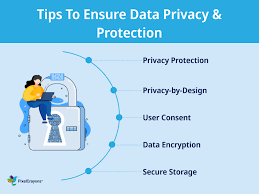Mobile app developers in the USA encounter a multifaceted regulatory landscape. They must proactively address various legal considerations to ensure compliance and minimize potential legal risks. One pivotal aspect is data privacy. The California Consumer Privacy Act (CCPA) is a significant regulation requiring developers to safeguard the personal information of California residents. If an app targets children under 13, it must adhere to the stringent Children’s Online Privacy Protection Act (COPPA), necessitating parental consent and robust privacy safeguards. Developers should also be mindful of the European General Data Protection Regulation (GDPR) if they process data from EU citizens.
It is essential to follow the app store guidelines to prevent being removed from platforms such as the Apple App Store and Google Play Store due to violations. To avoid infringement issues, intellectual property protection is necessary, and developers should make sure their apps are accessible to individuals with disabilities by the Americans with Disabilities Act (ADA). Additionally, they should avoid deceptive advertising and marketing practices, abide by consumer protection laws like the Federal Trade Commission Act, and establish comprehensive terms of service and privacy policies.
For apps handling payments, knowledge of payment processing regulations like the Payment Card Industry Data Security Standard (PCI DSS) is vital. Developers in the health or medical sector must consider compliance with the Health Insurance Portability and Accountability Act (HIPAA). Export control laws, such as the Export Administration Regulations (EAR), should be on their radar if their apps involve export-restricted technology or data. Staying vigilant, informed, and up-to-date with evolving regulations and consulting with legal experts are essential strategies for mobile app developers to successfully navigate the intricate legal landscape in the USA.
What makes an app legal?

To ensure that an app is legal and compliant with relevant laws and regulations, several key factors and considerations must be addressed:
Privacy and Data Protection :
Legal Considerations and Compliance with data protection laws, such as the General Data Protection Regulation (GDPR) in Europe or the California Consumer Privacy Act (CCPA) in the USA.
Clearly defined privacy policies and consent mechanisms for data collection and usage.
Secure storage and protection of user data to prevent unauthorized access or breaches.Intellectual Property :
Avoiding infringement of trademarks, copyrights, and patents belonging to others.
Obtaining proper licenses or permissions for any copyrighted materials used within the app.User Safety and Content :
Preventing the distribution of harmful or illegal content, such as hate speech, pornography, or violent materials.Implementing content moderation mechanisms to ensure a safe user experience.
Accessibility :
Compliance with accessibility standards to ensure that the app is usable by individuals with disabilities, as mandated by laws like the Americans with Disabilities Act (ADA).
Consumer Protection :
Avoiding deceptive advertising or marketing practices.
Complying with consumer protection laws, such as regulations against false or misleading claims.
It’s important to note that legal requirements can vary depending on the app’s functionality, target audience, and geographical reach. Therefore, app developers should conduct thorough legal research and seek legal advice to ensure full compliance with applicable laws and regulations.
Gaining insight into the legal and regulatory prerequisites.

Acquiring a comprehensive understanding of the legal and regulatory requirements is imperative for individuals, businesses, and organizations operating in virtually any industry. These prerequisites form the foundation upon which lawful and ethical operations are built, ensuring compliance with the law and the protection of the rights and interests of all stakeholders involved.
In the realm of business, these requirements encompass a broad spectrum of considerations. This includes adhering to industry-specific regulations, securing necessary licenses and permits, complying with taxation laws, and upholding intellectual property rights. Moreover, data protection and privacy regulations, such as the General Data Protection Regulation (GDPR) and the Health Insurance Portability and Accountability Act (HIPAA), mandate stringent protocols for handling sensitive information.
For technology-driven ventures like mobile app developers, legal considerations expand to encompass privacy policies, intellectual property protection, accessibility standards, and consumer protection laws. Furthermore, app store guidelines dictate compliance with platform-specific rules, ensuring the app’s availability and functionality on popular distribution platforms.
In essence, understanding these legal and regulatory prerequisites is a proactive measure to prevent legal disputes, financial penalties, and reputational damage. It fosters a framework for ethical and responsible conduct, safeguarding the interests of both businesses and consumers in an increasingly interconnected and regulated world. Legal professionals and compliance experts play a pivotal role in navigating this complex landscape, helping entities uphold their legal obligations while fostering trust and transparency within their respective industries.
Obstacles in Achieving App Development Compliance.

Navigating the intricate landscape of app development compliance poses multifaceted challenges for developers and businesses alike. Ensuring that an app aligns with various legal, regulatory, and ethical requirements demands meticulous attention to detail and ongoing diligence.
One of the foremost hurdles is privacy and data protection. With the proliferation of data breaches and heightened privacy concerns, adhering to laws like the General Data Protection Regulation (GDPR) and the California Consumer Privacy Act (CCPA) is paramount. Striking a balance between collecting user data for app functionality and respecting user privacy can be intricate.
Accessibility is another pivotal challenge. Developers must make apps accessible to individuals with disabilities, in compliance with laws like the Americans with Disabilities Act (ADA). This involves designing interfaces that accommodate various disabilities, such as visual or hearing impairments.
Intellectual property rights pose yet another hurdle. App developers must navigate complex copyright and trademark laws to avoid infringement and protect their intellectual property.
Moreover, the dynamic nature of the tech industry means staying current with evolving regulations is a perpetual challenge. Laws and standards can change rapidly, necessitating regular updates to app features and policies to remain compliant.
Lastly, the complexity of global regulations is a challenge for apps with international reach. Managing compliance with different countries’ laws regarding data protection, content, and taxation can be arduous.
In conclusion, while app development offers immense opportunities, it also presents formidable compliance challenges. Addressing these challenges effectively requires legal expertise, ongoing education, and a commitment to ethical practices.
Effective Measures for Ensuring Legal and Regulatory Compliance

Safeguarding legal and regulatory compliance is of paramount importance for individuals, businesses, and organizations across various sectors. Adopting effective measures is crucial to avoid legal complications, financial penalties, and reputational damage.
In-Depth Legal Research:
A proactive approach begins with thorough research into the applicable laws and regulations. Staying well-informed about industry-specific and regional requirements is essential.
Compliance Officer or Team:
Appointing a compliance officer or a dedicated team can streamline efforts to monitor and enforce compliance. These individuals can oversee regulatory changes and ensure adherence within the organization.
Comprehensive Policies and Procedures:
Develop and maintain detailed policies and procedures that clearly outline compliance expectations. Ensure these documents are accessible to all relevant stakeholders.
Regular Audits and Assessments:
Conduct periodic compliance audits and assessments to identify and rectify any non-compliance issues promptly. This proactive approach can mitigate risks and ensure ongoing adherence.
Employee Training and Awareness:
Provide training programs to educate employees about compliance requirements. An informed workforce is better equipped to comply with regulations.
Documented Records:
Maintain well-organized records of compliance efforts, audits, and any interactions with regulatory bodies. Proper documentation can provide evidence of compliance in case of scrutiny.
Initiate the planning of your legal documents right from the outset of the development process.

Commencing the planning of your legal documents at the very inception of the development process is a strategic imperative. This proactive approach ensures that the project adheres to legal requirements, mitigates risks, and promotes transparency.
At the outset, identify the key legal documents pertinent to your project. Common documents include terms of service, privacy policies, end-user license agreements (EULAs), and disclaimers. Craft these documents with meticulous attention to detail, ensuring they accurately reflect the nature of your application, data handling practices, and user rights and responsibilities.
Incorporating Legal Considerations and legal considerations early on also enables seamless integration with your app’s design and functionality. For example, privacy policies should align with data collection methods, consent mechanisms, and user interfaces. Likewise, terms of service should encompass user conduct within the app.
Engaging legal experts or consultants in the initial phases can provide invaluable insights and help draft robust, compliant documents. Continual collaboration between legal and development teams is essential for staying current with evolving regulations and addressing any legal challenges that may arise during the development lifecycle.
By integrating Legal Considerations and legal document planning as a foundational step, developers and businesses not only minimize legal risks but also build trust with users by demonstrating a commitment to responsible and ethical practices. This proactive approach fosters a strong foundation for successful app development and long-term compliance.
FAQ’S
1. What are the key privacy regulations app developers should be aware of in the USA?
- Mobile app developers in the USA should be aware of regulations such as the California Consumer Privacy Act (CCPA) and sector-specific regulations like the Health Insurance Portability and Accountability Act (HIPAA) if the app handles medical data.
2. Do I need a privacy policy for my app?
- Yes, it’s essential to have a privacy policy that discloses how user data is collected, used, and shared. Many app stores, including Apple’s App Store and Google Play Store, require a privacy policy for app listings.
3. How can I protect my app’s intellectual property?
- You can protect your app’s intellectual property by registering trademarks for the app name and logo and by registering copyrights for the app’s code and content. Consider consulting with an intellectual property attorney for guidance.
4. Are there specific regulations for apps targeting children?
- Yes, the Children’s Online Privacy Protection Act (COPPA) imposes strict requirements on apps that collect data from children under 13 years old. Compliance includes obtaining parental consent and maintaining child-friendly privacy practices.
5. What should I do to ensure my app is accessible to users with disabilities?
- To ensure accessibility, follow guidelines like the Web Content Accessibility Guidelines (WCAG). Make your app navigable with screen readers and provide alternative text for images and multimedia.

















